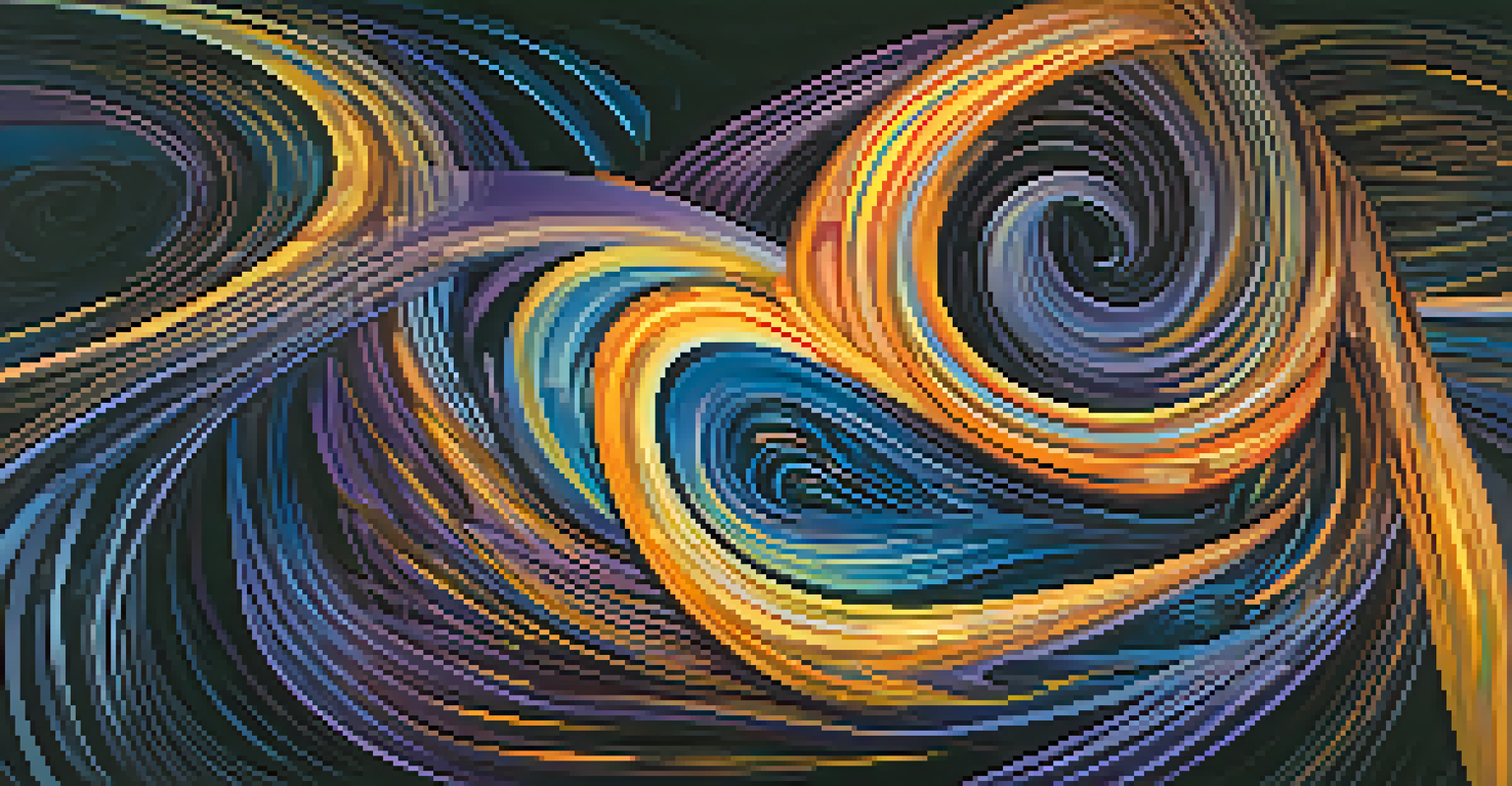The Intersection of Hallucinogens and Reality in Philosophy

Understanding Hallucinogens: A Brief Overview
Hallucinogens are substances that alter perception, mood, and cognitive processes. Common examples include LSD, psilocybin (magic mushrooms), and DMT. These substances can induce experiences that feel profoundly real to those who use them, leading to questions about the nature of reality itself.
The mind is everything. What you think you become.
Philosophically, hallucinogens draw attention to the ways our minds construct our experiences. When individuals consume these substances, they often report experiencing vivid imagery and altered states of consciousness that feel as genuine as waking life. This raises intriguing questions about the distinction between what is perceived and what is actual.
The relationship between hallucinogens and reality isn't just about the experiences themselves; it also invites us to engage with deeper philosophical inquiries. What does it mean to perceive something? How do we know what is real versus what is a product of our minds? These questions form the crux of many philosophical discussions.
Historical Perspectives on Hallucinogens in Philosophy
Throughout history, hallucinogens have played a significant role in various philosophical traditions. Ancient cultures, such as the Aztecs and Greeks, utilized these substances in religious ceremonies, believing they provided access to higher realms of understanding. Such practices suggest a long-standing recognition of their potential to alter consciousness and provoke philosophical inquiry.

Philosophers like Aldous Huxley have explored the idea of hallucinogens as a means to transcend ordinary perception. In his book 'The Doors of Perception,' Huxley discusses how substances like mescaline can expand consciousness, offering insights into the nature of reality and existence. His reflections highlight how altered states can lead to profound realizations.
Hallucinogens Challenge Reality's Nature
Hallucinogens blur the line between real and imagined experiences, prompting deeper philosophical inquiries about the nature of reality.
This historical context shows that the intersection of hallucinogens and philosophy is not a modern phenomenon. Instead, it has deep roots, indicating that humanity has long sought to understand the mind's relationship to reality through these powerful substances.
The Phenomenology of Hallucinogenic Experiences
Phenomenology is the philosophical study of experiences and consciousness. When we examine hallucinogenic experiences through this lens, we can gain insight into how these substances reshape our understanding of reality. Users often describe their experiences as deeply meaningful, filled with complex imagery and emotions that challenge conventional notions of time and space.
The doors of perception are cleansed; everything would appear to man as it is, infinite.
For instance, many users report experiencing a sense of unity with the universe, where personal identity seems to dissolve. This sensation can lead to feelings of interconnectedness that starkly contrast with everyday perceptions. Such experiences prompt philosophical questions about the self and its boundaries.
Moreover, phenomenology encourages us to appreciate the subjective nature of reality. By examining how hallucinogens impact individual perceptions, we can better understand the fluidity of human experience and the diverse ways reality can be interpreted.
Hallucinogens and the Nature of Reality
One of the most profound philosophical implications of hallucinogens is their ability to challenge our understanding of reality itself. Users often report that their experiences blur the line between what is real and what is imagined, leading to the question: if reality can be so easily altered, what does that say about its absolute nature?
Philosophers like Immanuel Kant argued that our understanding of reality is shaped by our perceptions. Hallucinogens seem to amplify this notion, suggesting that our grasp of reality is not as fixed as we might believe. Instead, it introduces the idea that multiple realities can coexist, depending on our mental state.
Historical Roots in Philosophy
Throughout history, various cultures have used hallucinogens in philosophical and religious contexts, highlighting their long-standing role in exploring consciousness.
This perspective encourages a more nuanced approach to understanding reality, one that acknowledges the complexities and variabilities of human perception. It invites further dialogue on how different states of consciousness can provide alternative insights into the world around us.
Ethical Considerations in Hallucinogen Use
While exploring the philosophical implications of hallucinogens, we must also consider the ethical dimensions surrounding their use. The potential for profound insights comes with risks, including psychological distress and the possibility of misuse. This raises ethical questions about who should have access to these substances and under what circumstances.
Furthermore, as hallucinogens gain acceptance in therapeutic contexts, such as treating PTSD or depression, ethical considerations become even more critical. How do we ensure that these substances are used responsibly and safely? Establishing guidelines and regulations is essential to protect individuals and society at large.
Ultimately, engaging with the ethical implications of hallucinogen use is vital for fostering a culture of responsible exploration. This ensures that the philosophical insights gained from these experiences contribute positively to our understanding of reality without compromising individual well-being.
Modern Philosophical Movements and Hallucinogens
In contemporary philosophy, the conversation around hallucinogens has gained momentum, particularly within movements that seek to explore consciousness and reality. Scholars and thinkers are increasingly recognizing the potential of these substances to contribute to philosophical discourse. This resurgence reflects a broader cultural interest in mindfulness and altered states of consciousness.
Modern philosophers are examining the implications of hallucinogens not just for individual experience but for collective understanding. This includes discussions on how shared hallucinogenic experiences can shape cultural narratives and influence societal beliefs about reality.
Ethics of Hallucinogen Use
The exploration of hallucinogens raises important ethical questions regarding their safe and responsible use, especially in therapeutic settings.
By integrating hallucinogens into modern philosophical discussions, we open up new avenues for understanding the mind, consciousness, and the human experience. This engagement can potentially lead to transformative shifts in how we perceive reality and our place within it.
The Future of Hallucinogens in Philosophy
As research into the effects of hallucinogens continues to evolve, so too does their potential impact on philosophical inquiry. Advances in neuroscience and psychology are shedding light on how these substances affect the brain, prompting new questions about consciousness and perception. This intersection of science and philosophy holds exciting possibilities for future exploration.
Moreover, as societal attitudes towards hallucinogens shift, we may see an increase in their integration into philosophical discussions. This could lead to more inclusive conversations that bridge the gap between traditional philosophical thought and contemporary experiences with altered states.

Looking ahead, the future of hallucinogens in philosophy seems promising. By fostering dialogue around these substances, we can deepen our understanding of reality and the complexities of human consciousness, paving the way for new philosophical insights.